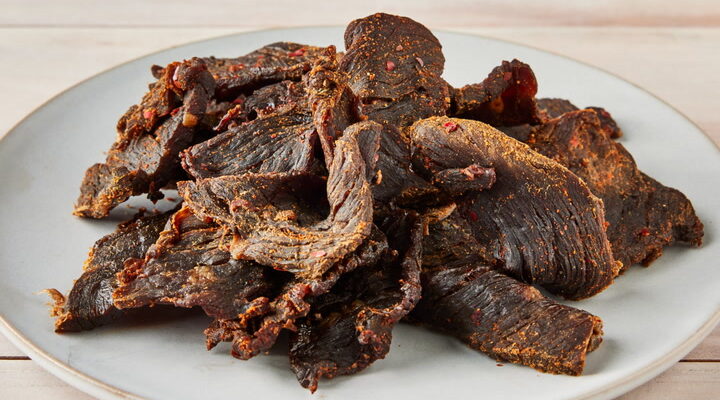Jerky Marinade Recipe: Who doesn’t love a good batch of homemade jerky? Whether you’re hiking, camping, or just craving a protein-packed snack, jerky is one of the best options around. But here’s the secret—what makes jerky truly irresistible is the marinade. The marinade decides if your jerky turns out bland, savory, sweet, spicy, or smoky.
Making your own jerky marinade at home is easier than you think. Not only does it give you control over the flavors, but it also ensures you’re eating a healthier, preservative-free snack. This guide will walk you through the ingredients you need, tools required, and a step-by-step method to make the perfect jerky marinade from scratch.
What is Jerky Marinade?
Jerky marinade is the flavorful liquid mixture that transforms plain slices of meat into savory, mouthwatering jerky. It usually consists of a balance of salty, sweet, spicy, and umami ingredients that soak into the meat before drying or cooking. This step is crucial because jerky on its own can taste flat—marinade gives it character.
Think of jerky marinade as the paint on a blank canvas. Without it, the meat is just meat. With it, you can craft dozens of unique flavors, from teriyaki to spicy chili. The beauty of marinade is that you’re not limited to one recipe—you can customize it to suit your taste preferences.
Why Making Your Own Marinade is Better?
Sure, you can buy pre-made jerky or marinade mixes at the store. But here’s why homemade beats store-bought every time:
- Healthier Choice: Store-bought jerky is often packed with preservatives, artificial flavors, and excess sodium. Making your own means you control what goes in.
- Flavor Flexibility: Want it spicier? Sweeter? Smokier? Adjust the ingredients however you like.
- Cost-Effective: A homemade marinade and a batch of jerky cost a fraction of what you’d pay for packaged jerky at the store.
- Freshness Guaranteed: Fresh ingredients make a noticeable difference in taste and aroma.
Ingredients You’ll Need for Jerky Marinade
Essential Ingredients
Here’s a simple list of ingredients that make a flavorful jerky marinade:
- Soy Sauce – Adds saltiness and umami depth.
- Worcestershire Sauce – Brings tang and complexity.
- Brown Sugar or Honey – Adds a touch of sweetness.
- Garlic Powder – Boosts savory notes.
- Onion Powder – Complements garlic and enhances flavor.
- Black Pepper – Provides mild heat.
- Smoked Paprika or Liquid Smoke – Delivers smoky flavor without a smoker.
Optional Ingredients for Extra Flavor
Want to experiment? Try adding:
- Crushed Red Pepper Flakes – For a spicy kick.
- Ginger – Perfect for Asian-inspired jerky.
- Apple Cider Vinegar – Balances flavors with acidity.
- Hot Sauce – For heat lovers.
- Maple Syrup or Molasses – Adds a deep, rich sweetness.
Choosing the Right Meat for Jerky
The marinade is important, but the meat you choose makes or breaks the jerky. Here are some great options:
- Beef (Top Round, Sirloin Tip, or Flank Steak): Classic choice with lean cuts.
- Turkey or Chicken: Lighter alternative with less fat.
- Venison: Perfect for hunters—rich and gamey flavor.
- Fish or Salmon: For a unique twist on traditional jerky.
Pro Tip: Always choose lean cuts of meat. Too much fat makes jerky spoil quickly.
Tools and Equipment You’ll Need
Kitchen Tools for Preparing Marinade
Before you start, gather the right tools:
- Mixing bowl for combining ingredients.
- Measuring cups and spoons for accuracy.
- Sharp knife for slicing meat thinly.
- Cutting board for safe prep.
- Ziplock bags or glass containers for marinating.
Storing and Marinating Essentials
- Ziplock Bags/Glass Jars: Ideal for soaking the meat evenly.
- Refrigerator: Keeps meat fresh while marinating.
- Dehydrator or Oven: To dry out your jerky.
- Airtight Containers: For storing finished jerky.
Step-by-Step Guide to Making Jerky Marinade
Step 1 – Prepare the Meat
Start by selecting a lean cut of meat. Trim off all visible fat—fat doesn’t dehydrate well and will make your jerky spoil faster. Slice the meat into thin strips (about ¼ inch thick). For easier slicing, freeze the meat slightly for about 1–2 hours.
If you prefer chewy jerky, cut with the grain. For tender jerky, cut against the grain.
Step 2 – Mix the Marinade Ingredients
In a large bowl, mix together your base ingredients—soy sauce, Worcestershire sauce, garlic powder, onion powder, brown sugar, black pepper, and smoked paprika. Stir until the sugar dissolves and all spices are well combined.
This is your flavor foundation. At this point, taste the marinade and adjust. Want it sweeter? Add more honey. Need more kick? Toss in extra chili flakes.
Step 3 – Marinate the Meat Properly
Place your sliced meat into a ziplock bag or glass container. Pour the marinade over the meat, ensuring every strip is well-coated. Seal the container tightly and refrigerate for at least 12 hours (24 hours is even better).
The longer you marinate, the deeper the flavor. Make sure to turn or mix the bag occasionally so every piece gets equal exposure to the marinade.
Step 4 – Dehydrate or Cook the Jerky
Once marinated, remove the meat from the fridge and pat dry with paper towels to remove excess marinade. Lay the strips on dehydrator trays or oven racks.
- Dehydrator Method: Dry at 160°F (70°C) for 4–6 hours until fully dehydrated.
- Oven Method: Place strips on a wire rack over a baking sheet, set oven to the lowest setting, and dry for 4–6 hours.
The jerky should be dry but still flexible—not brittle.
Best Tips for Perfect Jerky
How Long Should You Marinate the Meat?
The length of marination plays a huge role in how flavorful your jerky turns out. A minimum of 6–8 hours is required for the flavors to penetrate the meat, but the sweet spot is usually 24 hours. If you want bolder, richer flavors, you can even leave it marinating for up to 48 hours.
Keep in mind, though, that over-marinating can sometimes make the jerky overly salty or too strong in certain flavors. The best practice is to taste-test your marinade before pouring it on the meat. If it feels too salty in liquid form, cut back a little on soy sauce or add a splash of water.
A helpful trick is to divide your batch of meat into two bags—marinate one for 12 hours and another for 24 hours. This way, you can experiment and see which one matches your taste preference.
Common Mistakes to Avoid
When making jerky, even small mistakes can ruin your batch. Here are a few pitfalls to avoid:
- Using Fatty Cuts of Meat: Fat doesn’t dry properly and can cause jerky to spoil quickly.
- Not Slicing Evenly: Uneven slices mean some pieces will be over-dried while others remain too chewy.
- Skipping the Pat-Dry Step: Leaving excess marinade on the strips can cause uneven drying and sticky jerky.
- Overcrowding in the Dehydrator/Oven: Air circulation is key—give each strip enough room.
- Overcooking: Jerky should bend and crack, not snap. If it’s brittle, it’s too dry.
Avoiding these mistakes ensures your jerky turns out flavorful, chewy, and long-lasting.
Storing Your Jerky the Right Way
After all the effort you’ve put in, you don’t want your jerky to spoil. Proper storage is just as important as preparation.
- Room Temperature: Store in an airtight container or vacuum-sealed bag for up to 1–2 weeks.
- Refrigerator: Keeps jerky fresh for 2–3 months.
- Freezer: Vacuum-sealed jerky can last up to 6 months without losing quality.
If you plan on making jerky regularly, investing in a vacuum sealer is worth every penny. It extends shelf life, locks in flavor, and prevents moisture from sneaking in.
Variations of Jerky Marinade Recipes
Sweet and Smoky Marinade
Perfect for those who love a balance of flavors, this recipe combines brown sugar, smoked paprika, soy sauce, and honey. The sweetness pairs beautifully with the smokiness, creating an addictive jerky flavor.
- ½ cup soy sauce
- ¼ cup Worcestershire sauce
- 2 tbsp brown sugar
- 1 tbsp honey
- 1 tsp smoked paprika
- ½ tsp garlic powder
This works particularly well with beef and venison, giving you that campfire-style jerky even without a smoker.
Spicy and Hot Marinade
If you love heat, this one’s for you. Packed with chili flakes, hot sauce, and cayenne pepper, this marinade will deliver a fiery kick.
- ½ cup soy sauce
- 2 tbsp hot sauce (your favorite brand)
- 1 tsp cayenne pepper
- 1 tsp black pepper
- 1 tbsp apple cider vinegar
- 1 tsp garlic powder
This marinade works wonders on lean beef, creating a bold, spicy snack that’s not for the faint of heart.
Teriyaki Marinade
For an Asian-inspired twist, teriyaki marinade delivers sweet, tangy, and savory notes. It’s one of the most popular jerky flavors worldwide.
- ½ cup soy sauce
- ¼ cup pineapple juice
- 2 tbsp brown sugar
- 1 tbsp ginger (fresh or powdered)
- 1 clove garlic, minced
- 1 tbsp sesame oil
This is an excellent choice for beef or turkey jerky, offering a lighter, sweeter profile.
Classic BBQ Marinade
Smoky, tangy, and sweet—this is the go-to flavor for barbecue lovers.
- ½ cup BBQ sauce
- 2 tbsp soy sauce
- 1 tbsp molasses or honey
- 1 tsp onion powder
- ½ tsp black pepper
- 1 tsp liquid smoke
This recipe gives your jerky that backyard barbecue taste, perfect for summer snacks or camping trips.
Nutritional Value of Homemade Jerky
Protein Benefits
Homemade jerky is a powerhouse of protein, making it a favorite among athletes, hikers, and anyone looking for a high-energy snack. A single serving can pack anywhere from 9–15 grams of protein, depending on the meat used.
Protein helps with muscle repair, keeps you full longer, and provides sustained energy. Unlike sugary snacks, jerky won’t cause sudden energy crashes.
Healthier Alternative to Store-Bought
Store-bought jerky often contains unnecessary preservatives, MSG, and excessive sodium. By making your own, you:
- Reduce Sodium: Control salt levels to your preference.
- Avoid Chemicals: No artificial additives.
- Use Natural Sweeteners: Honey or maple syrup instead of corn syrup.
- Customize Nutrition: Choose lean meats, less sugar, and balanced seasoning.
Homemade jerky isn’t just tastier—it’s also a guilt-free, nutrient-dense snack.
FAQs about Jerky Marinade Recipe
Q1: Can I reuse jerky marinade?
No, it’s not safe to reuse marinade that has touched raw meat. Always make a fresh batch if needed.
Q2: Can I marinate meat for too long?
Yes. More than 48 hours can make jerky too salty or overpowering in flavor.
Q3: Do I need a dehydrator to make jerky?
No. An oven set to low heat works just fine, though a dehydrator is more efficient.
Q4: What’s the best cut of beef for jerky?
Top round, flank steak, or sirloin tip are excellent lean options.
Q5: How can I make jerky less salty?
Use low-sodium soy sauce and balance with more sweeteners or acidity (vinegar or citrus juice).
Conclusion
Making jerky at home is more than just cooking—it’s an experience. With the right ingredients, tools, and step-by-step method, you can create flavorful, healthy, and long-lasting jerky snacks that rival any store-bought version. From classic BBQ to spicy chili or sweet teriyaki, the possibilities are endless once you master the marinade.
Whether you’re preparing snacks for hiking trips, post-workout energy, or simply enjoying at home, this jerky marinade recipe guide ensures you’ll never run out of tasty options.
So, get your favorite cut of meat, mix up a batch of marinade, and start experimenting—your perfect jerky flavor is waiting to be discovered!



